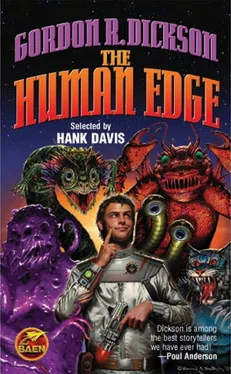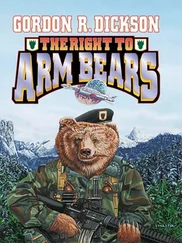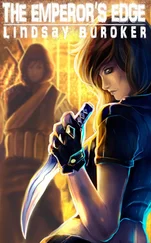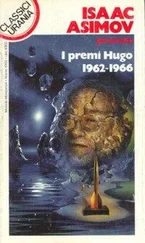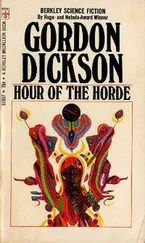* * *
There followed several weeks in which the Envoy found himself being convoyed around the planet which had originally been the seat of the former Bahrin ruling group. It was quite obviously a tactic to observe him over a period of time and under various conditions; and he did not try to resist it He had his own observations to make, and this gave him an excellent opportunity to do so.
For one thing, he noted down as his opinion that they were an exceedingly touchy people where slights were concerned. Here they had just finished their war with the Bahrin in the last decade and were facing entrance into an interstellar society of races as violent as themselves; and yet the first questions on the tips of the tongues of nearly all those he met were concerned with the Shielded Worlds. Even Harrigan, or whatever his name was, confessed to an interest in the people on the Invulnerable planets.
“How long have they been like that?” Harrigan asked.
The Envoy could not shrug. His pause before answering fulfilled the same function.
“There is no way of telling,” he said. “Things on Shielded Worlds are as the people there make them. Take away the signs of a technical civilization from a planet—turn it all into parkland—and how do you tell how long the people there have been as they are? All we ever knew is that they are older than any of our histories.”
“Older?” said Harrigan. “There must be some legend, at least, about how they came to be?”
“No,” said the Envoy. “Oh, once in a great while some worthless planet without a population will suddenly develop a shield and become fertile, forested and populated—but this is pretty clearly a case of colonization. The Invulnerables seem to be able to move from point to point in space by some nonphysical means. That’s all.”
“All?” said Harrigan.
“All,” said the Envoy. “Except for an old Submissive superstition that the Shielded Peoples are a mixed race sprung from an interbreeding between a Conqueror and a Submissive type—something we know, of course, to be a genetic impossibility.”
“I see,” said Harrigan.
Harrigan took the Envoy around to most of the major cities of the planet. They did not visit any military installations (the Envoy had not expected that they would) but they viewed a lot of new construction taking the place of Bahrin buildings that had been obliterated by the angry scars of the war. It was going up with surprising swiftness—or perhaps not so surprising, noted the Envoy thoughtfully, since the humans seemed to have been able to enlist the enthusiastic cooperation of the Submissives they had taken over. The humans appeared to have a knack for making conquered peoples willing to work with them. Even the Bahrin, what there were left of them, were behaving most unlike a recently crushed race of Conquerors, in the extent of their cooperation. Certainly the humans seemed to be allowing their former enemies a great deal of freedom, and even responsibility in the new era. The Envoy sought for an opportunity, and eventually found the chance to talk to one of the Bahrin alone. This particular Bahrin was an assistant architect on a school that was being erected on the outskirts of one city. (The humans seemed slightly crazy on the subject of schools; and only slightly less crazy on the subjects of hospitals, libraries, museums, and recreation areas. Large numbers of these were going up all over the planet.) This particular Bahrin, however, was a male who had been through the recent war. He was middle-aged and had lost an arm in the previous conflict. The Envoy found him free to talk, not particularly bitter, but considerably impressed emotionally by his new overlords.
“…May your courage be with you,” he told the Envoy. “You will have to face them sooner or later; and they are demons.”
“What kind of demons?” said the Envoy, skeptically.
“A new kind,” said the Bahrin. He rested his heavy, furry, bear-like forearm upon the desk in front of him and stared out a window at a changing landscape. “Demons full of fear and strange notions. Who understands them? Half their history is made up of efforts to understand themselves—and they still don’t.” He glanced significantly at the Envoy. “Did you know the Submissives are already starting to call them the Mixed People?”
The Envoy wrinkled his furry brow.
“What’s that supposed to mean?” he said.
“The Submissives think the humans are really Submissives who have learned how to fight.”
The Envoy snorted.
“That’s ridiculous.”
“Of course,” said the Bahrin; and sighed heavily. “But what isn’t, these days?” He turned back to his work. “Anyway, don’t ask me about them. The more I see of them, the less I understand.”
* * *
They parted on that note—and the Envoy’s private conviction that the loss of the Bahrin’s arm had driven him slightly insane.
Nonetheless, during the following days as he was escorted around from spot to spot, the essence of that anomaly over which he was later to puzzle during his trip home, emerged. For one thing, there were the schools. The humans, evidently, in addition to being education crazy themselves, believed in wholesale education for their cattle as well. One of the schools he was taken to was an education center for young Bahrin pupils; and—evidently due to a shortage of Bahrin instructors following the war—a good share of the teachers were human.
“…I just love my class!” one female human teacher told the Envoy, as they stood together watching young Bahrin at play during their relaxation period.
“Please?” said the Envoy, astounded.
“They’re so quick and eager to learn,” said the teacher. One of the young Bahrin at play dashed up to her, was overcome with shyness at seeing the Envoy, and hung back. She reached out and patted him on the head. A peculiar shiver ran down the Envoy’s back; but the young Bahrin nestled up to her.
“They respond so,” said the teacher. “Don’t you think so?”
“They were a quite worthy race at one time,” replied the Envoy, with mingled diplomatic confusion and caution.
“Oh, yes!” said the teacher enthusiastically; and proceeded to overwhelm him with facts he already knew about the history of the Bahrin, until the Envoy found himself rescued by Harrigan. The Envoy went off wondering a little to himself whether the humans had indeed conquered the Bahrin or whether, perhaps, it had not been the other way around.
Food for that same wonderment seemed to be supplied by just about everything else that Harrigan let him see. The humans, having just about wiped the Bahrin out of existence, seemed absolutely determined to repair the damage they had done, but improve upon the former situation by way of interest. Why? What kept the Bahrin from seething with plans for revolt at this very minute? The young ones of course—like that pupil with the teacher—might not know any better; but the older ones…? The Envoy thought of the one-armed Bahrin architect he had talked to, and felt further doubt. If they were all like that one—but then what kind of magic had the humans worked to produce such an intellectual and emotional victory? The Envoy went back to his quarters and took a nap to quiet the febrillations of his thinking process.
When he woke up, he set about getting hold of what history he could on the war just past. Accounts both human and Bahrin were available; and, plowing through them, reading them for statistics rather than reports, he was reluctantly forced to the conclusion that the one-armed Bahrin had been right. The humans were demons. —Or at least, they had fought like demons against the Bahrin. A memory of the shiver that had run down his back as he watched the female human teacher patting the young Bahrin on head, troubled the Envoy again. Would this same female be perfectly capable of mowing down adult Bahrin by the automatic hand-weapon clipful? Apparently her exact counterparts had. If so, which was the normal characteristic of the human nature—the head-patting, or the trigger-pulling?
Читать дальше
